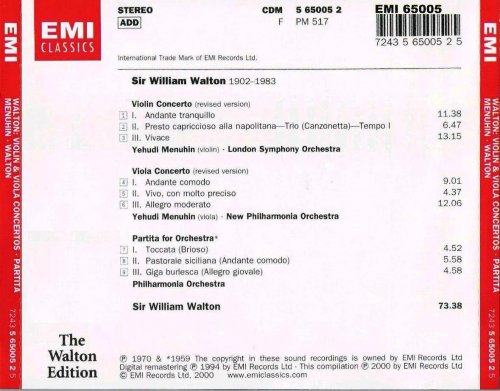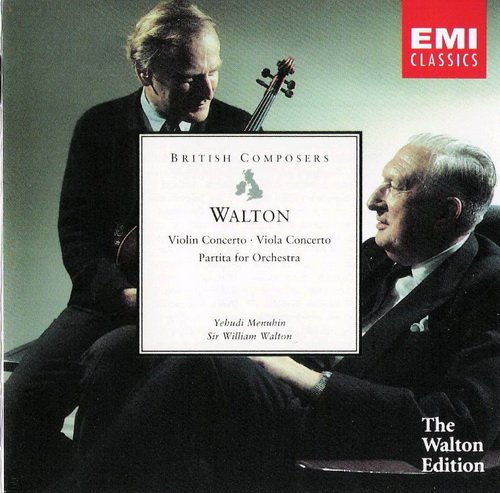
Yehudi Menuhin, Sir William Walton - Walton: Violin & Viola concertos, Partita (1994) CD-Rip
BAND/ARTIST: Yehudi Menuhin, Sir William Walton
- Title: Walton: Violin & Viola concertos, Partita
- Year Of Release: 1994
- Label: EMI Classics
- Genre: Classical
- Quality: FLAC (image+.cue,log,scans)
- Total Time: 73:38
- Total Size: 372 Mb
- WebSite: Album Preview
Tracklist:
Violin Concerto (revised version)
1 I. Andante tranquillo [11.38]
2 II. Presto capriccioso alia napolitana — Trio (Canzonetta) — Tempo I [6.47]
3 III. Vivace [13.15]
Yehudi Menuhin (violin) London Symphony Orchestra
Viola Concerto (revised version)*
4 I. Andante comodo [9.01]
5 II. Vivo, con rnolto preciso [4.37]
6 III. Allegro moderato [12.06]
Yehudi Menuhin (viola) - New Phiiharmonia Orchestra
Partita for Orchestra
7 I. Toccata (Brioso) [4.52]
8 II. Pastorale siciliana (Andante comodo) [5.58]
9 III. Giga burlesca (Allegro giovale) [4.58]
Phiiharmonia Orchestra
Recorded in No.l Studio. Abbey Road. London. 12-15 July 1969 and *9~11 October 1968, and 'Kingsway Hall, London, 6 & 16 February 1959

Violin Concerto (revised version)
1 I. Andante tranquillo [11.38]
2 II. Presto capriccioso alia napolitana — Trio (Canzonetta) — Tempo I [6.47]
3 III. Vivace [13.15]
Yehudi Menuhin (violin) London Symphony Orchestra
Viola Concerto (revised version)*
4 I. Andante comodo [9.01]
5 II. Vivo, con rnolto preciso [4.37]
6 III. Allegro moderato [12.06]
Yehudi Menuhin (viola) - New Phiiharmonia Orchestra
Partita for Orchestra
7 I. Toccata (Brioso) [4.52]
8 II. Pastorale siciliana (Andante comodo) [5.58]
9 III. Giga burlesca (Allegro giovale) [4.58]
Phiiharmonia Orchestra
Recorded in No.l Studio. Abbey Road. London. 12-15 July 1969 and *9~11 October 1968, and 'Kingsway Hall, London, 6 & 16 February 1959
Are composers the best interpreters of their own works? Much depends on the composer. Benjamin Britten turned in unequaled performances of his own compositions; Igor Stravinsky's recordings are still highly controversial. Based on the evidence of this recording, William Walton lies somewhere in the middle. The liner notes tell us that Walton only conducted his own music (not unlike Stravinsky), and this 2 CD set gives us a good representation of his art: the First Symphony, the oratorio "Belshazzar's Feast," the Violin and Viola Concertos, and a Partita for Orchestra. If nothing else, the recordings provide a sense of what Walton might have heard as he wrote the scores.
The First Symphony is one of the most strongest symphonies of the twentieth century, a work with the scope of Mahler, the intensity of Shostakovich, and the lyricism of Sibelius. It is a rugged work, and clearly sits at the very edge of Walton's capabilities as a conductor. Walton doesn't quite the find overarching arc of the music as Bernard Haitink does in what is probably the best recording of the symphony: Walton: Symphonies Nos. 1 & 2 / Cello Concerto / Violin Concerto. In the first movement you can almost hear the orchestra stop before each mood and tempo change, like a car grinding its gears. The "Presto con malizia" movement lacks tension. Famously, the final movement was written a year after the rest of the symphony--and the Walton recording is the one where you can actually tell. Unlike most other interpretations, it feels deliberately lightweight. The other drawback to this recording is the mono sound: while this is a clear and vivid mono (not the frequently boxy EMI 1950s acoustic), the climaxes feel restricted, negating the full power of the music.
So what are the advantages of Walton's interpretation? He captures the sheer Italianate beauty of his music like nobody else: the "Andante con malinconia" may not be deep, but it is intoxicating to listen to. And while Walton may sculpt his music section by section, this allows one to hear lots of orchestral details that go missing in more unified conceptions of the work. Walton's method of conducting works better in "Belshazzar's Feast," where the stops and starts are built into the music. Never have the saxophones in the "Praise ye the God of Gold" section sounded so jazzy, and the conclusion runs excitingly pell-mell towards the finish line. Walton isn't as theatrical as the Andre Previn recording, which remains the benchmark (William Waltons Symphonies & Co), but this recording is a good representation of the work.
But when we turn to the second CD, we find that Walton could superlative readings of his works. It may help that his soloist in the concertos was Yehudi Menuhin, who gives strong and sympathetic performances here; it may also help that the individual movements in these works have fewer shifts in tempo and mood than than the First Symphony. (Nor does it hurt that the stereo engineering is spectacular.) These are warm-blooded performances that capture the supposed "Italianate" side of Walton's music. The CD concludes with a glorious reading of the "Partita for Orchestra," a witty and joyous celebratory piece of music.
Fans of Walton will want this disc. While there have been stronger Walton's recording of his First Symphony (I recommend Haitink or Previn), Walton's own recording is not without interest and insight. (It certainly isn't as flaccid as Malcolm Sargent's, which is included in the box set of Symphonies above.) The Concertos and the "Partita" are worth the price of the whole set. You won't go too far wrong with this set, and serious fans of William Walton and his music will need to have this in their collections.
The First Symphony is one of the most strongest symphonies of the twentieth century, a work with the scope of Mahler, the intensity of Shostakovich, and the lyricism of Sibelius. It is a rugged work, and clearly sits at the very edge of Walton's capabilities as a conductor. Walton doesn't quite the find overarching arc of the music as Bernard Haitink does in what is probably the best recording of the symphony: Walton: Symphonies Nos. 1 & 2 / Cello Concerto / Violin Concerto. In the first movement you can almost hear the orchestra stop before each mood and tempo change, like a car grinding its gears. The "Presto con malizia" movement lacks tension. Famously, the final movement was written a year after the rest of the symphony--and the Walton recording is the one where you can actually tell. Unlike most other interpretations, it feels deliberately lightweight. The other drawback to this recording is the mono sound: while this is a clear and vivid mono (not the frequently boxy EMI 1950s acoustic), the climaxes feel restricted, negating the full power of the music.
So what are the advantages of Walton's interpretation? He captures the sheer Italianate beauty of his music like nobody else: the "Andante con malinconia" may not be deep, but it is intoxicating to listen to. And while Walton may sculpt his music section by section, this allows one to hear lots of orchestral details that go missing in more unified conceptions of the work. Walton's method of conducting works better in "Belshazzar's Feast," where the stops and starts are built into the music. Never have the saxophones in the "Praise ye the God of Gold" section sounded so jazzy, and the conclusion runs excitingly pell-mell towards the finish line. Walton isn't as theatrical as the Andre Previn recording, which remains the benchmark (William Waltons Symphonies & Co), but this recording is a good representation of the work.
But when we turn to the second CD, we find that Walton could superlative readings of his works. It may help that his soloist in the concertos was Yehudi Menuhin, who gives strong and sympathetic performances here; it may also help that the individual movements in these works have fewer shifts in tempo and mood than than the First Symphony. (Nor does it hurt that the stereo engineering is spectacular.) These are warm-blooded performances that capture the supposed "Italianate" side of Walton's music. The CD concludes with a glorious reading of the "Partita for Orchestra," a witty and joyous celebratory piece of music.
Fans of Walton will want this disc. While there have been stronger Walton's recording of his First Symphony (I recommend Haitink or Previn), Walton's own recording is not without interest and insight. (It certainly isn't as flaccid as Malcolm Sargent's, which is included in the box set of Symphonies above.) The Concertos and the "Partita" are worth the price of the whole set. You won't go too far wrong with this set, and serious fans of William Walton and his music will need to have this in their collections.

DOWNLOAD FROM ISRA.CLOUD
Walton - Violin & viola concertos - Partita - Menuhin - Walton.rar - 372.9 MB
Walton - Violin & viola concertos - Partita - Menuhin - Walton.rar - 372.9 MB
Classical | FLAC / APE | CD-Rip
As a ISRA.CLOUD's PREMIUM member you will have the following benefits:
- Unlimited high speed downloads
- Download directly without waiting time
- Unlimited parallel downloads
- Support for download accelerators
- No advertising
- Resume broken downloads


